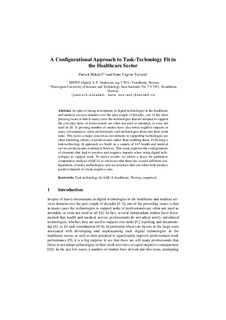A Configurational Approach to Task-Technology Fit in the Healthcare Sector
Journal article, Peer reviewed
Accepted version

Åpne
Permanent lenke
http://hdl.handle.net/11250/2644372Utgivelsesdato
2019Metadata
Vis full innførselSamlinger
Originalversjon
https://doi.org/10.1007/978-3-030-36691-9_15Sammendrag
In spite of strong investments in digital technologies in the healthcare and medical services domain over the past couple of decades, one of the most pressing issues is that in many cases the technologies that are adopted to support the everyday tasks of professionals are often not used as intended, or even not used at all. A growing number of studies have also noted negative impacts in many circumstances when professionals such technologies them into their work tasks. This poses a major concern as investments in supporting technologies are often hindering efforts of professionals rather than enabling them. Following a task-technology fit approach we build on a sample of 445 health and medical service professionals working in Norway. This study explores the configurations of elements that lead to positive and negative impacts when using digital technologies to support work. To derive results, we utilize a fuzzy set qualitative comparative analysis (fsQCA) to showcase that there are several different configurations of tasks, technologies, and use practices that can either help produce positive impacts or create negative ones.